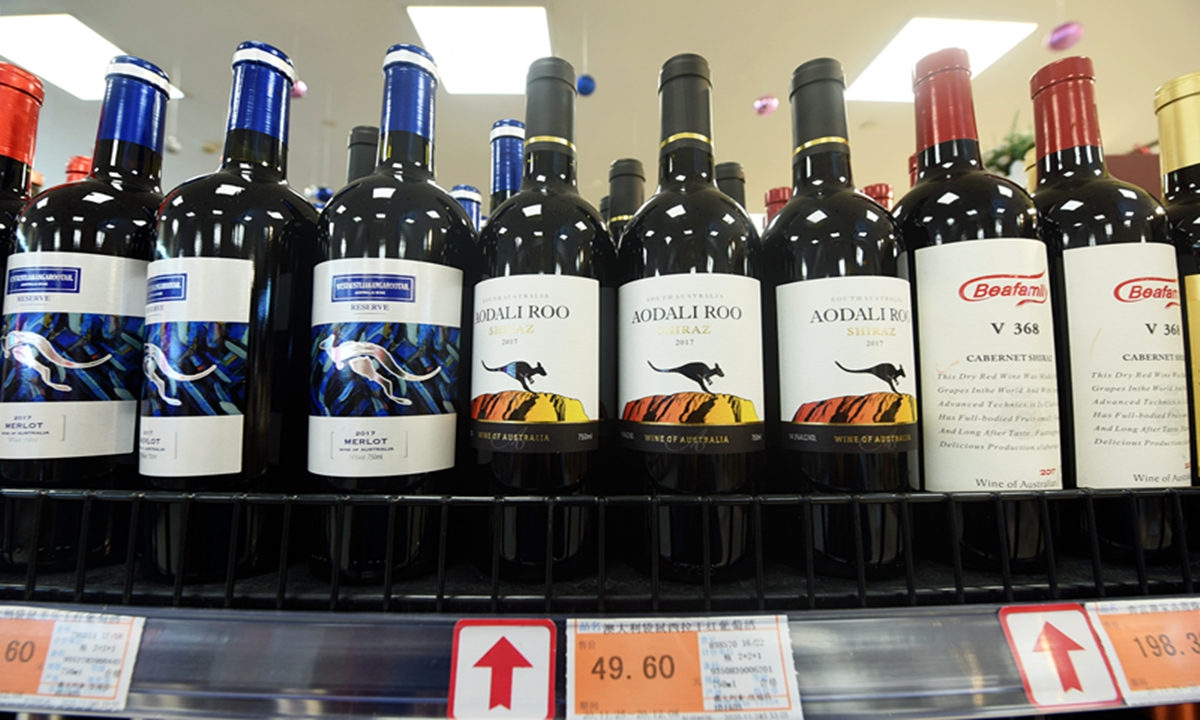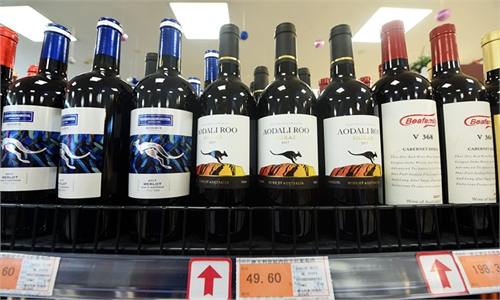Europe, South American wine traders expect bigger share in China market after anti-dumping duties on Australia
Europe, South American traders expect bigger share after anti-dumping duties on Australia

Bottles of Australian wine on the shelf of a supermarket in Hangzhou, East China's Zhejiang Province on November 27, 2020 Photo: VCG
Winemakers from Europe and South America may enter a golden period of development in the Chinese market, the fifth-largest wine consumer in the world and the largest in Asia, after China imposed anti-dumping duties on Australian wine, leaving a 40-percent market gap to fill.
Since March 28 when China's Ministry of Commerce imposed anti-dumping duties of 116.2-218.4 percent on Australian wine for a five-year period, imports from France, Italy, Chile and other markets into China have accelerated significantly, with imports of Italian wines even doubling as consumption picks up, media reported.
The growth of wine imports from other sources after heavy duties were imposed on Australian wine in response to Australian government subsidies has disrupted the level playing field in the market, several wine traders and industry representatives told the Global Times on Sunday.
"It's an industry-wide competition," a source with the wine branch of the China Alcoholic Drinks Association told the Global Times, referring to the market share lost by Australian wine.
China has been Australia's largest foreign wine market, purchasing nearly 40 percent of its wine exports, according to Wine Australia.
"Australian wine had a big share in China, and there is surely a gap to fill after the sanctions. This offers scope for other wine-exporting countries to increase their shares in the Chinese market, including New Zealand, Bulgaria and Georgia," said the source.
Australian wine was supported by dumping and subsidies, which caused substantial damage to China's wine industry, according to the ruling.
Australian wine saw declines of up to 20 percent in market share starting last November when the preliminary anti-dumping rate of up to 212 percent was announced.
Some traders who used to handle Australian wine have found bigger opportunities with other sources.
Chen Wei, manager of the Shishun International Trade Co, told the Global Times that his company has implemented a shift to wines from other countries.
"The mid-level niche market, formerly predominantly occupied by Australian wine, is being coveted and grabbed by competitors from other countries," Chen said.
"As far as we are concerned, our shift to replace Australian wine with Chilean wine is going well. The process takes several months and our first container just arrived at Chinese customs," Chen said, predicting the shift would be a smooth one as their pick enjoys a similar niche market with that of Australian wine - which has also seen a decline in stockpiles.
As most traders of Australian wine have all of a sudden shifted and rushed to trade in Chilean wine, the prices of Chilean wines have been pushed up slightly while Italian wines, Spanish wines, French wines and other countries have their prices relatively stable, Chen said. "Everybody [country] benefited, Chile benefited the most."
Tariffs on Australian wine also expedite the process of domestic wine toward stronger brand and a more worthy competitor to foreign rivals, Chen said.
"There is no new imported Australian wine this year, and the bottles on sale were all imported last year," another wine merchant told the Global Times. But the decline in volume has been offset by a rise in prices, especially for fine wines. He said that his company has doubled the price of Australian Penfolds to about 1,000 yuan ($153.4).
"Now it's mainly Chilean wine, because there's no tariff," said the merchant.
As of early 2021, there were 201 Chilean wineries exporting their vintages to China, and 20 of them had offices in China. China has been the top destination for bottled wine exports from Chile for three consecutive years, according to Chile's Ministry of Agriculture.
Some Australian wine traders have admitted to some losses in the Chinese market, but they believe that the market is on the right track, with anti-dumping measures in place.
"China is a relatively large market outside of Australia, and the short-term impact can be serious," an Australian boutique wine dealer told the Global Times on Sunday on condition of anonymity.
"But it will be beneficial to us in the long run," she said, noting that the Chinese government's anti-dumping investigation against Australian wine sellers will help better regulate the market and leave more scope for high-end wine from Australia to enter the Chinese market.
Australian wine has a large import export volume and enjoys a lot of subsidies from the Australian government. Consequently, its price dumping has had a great impact on China's wine sector and there's unfair competition, experts said.
However, whether Chinese wine companies can seize this opportunity is uncertain, because the anti-dumping probe has a timeline and can only be seen as a temporary benefit to the domestic wine industry, said Song Shuyu, chairman of the China Alcoholic Drinks Association, 21st Century Business Herald reported on Friday.


